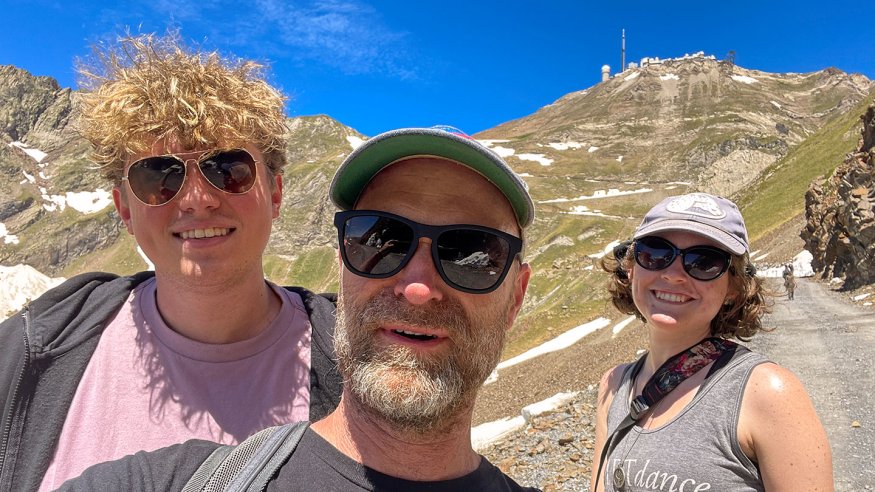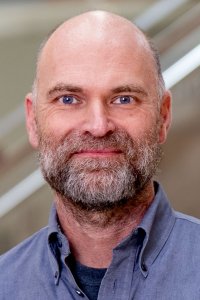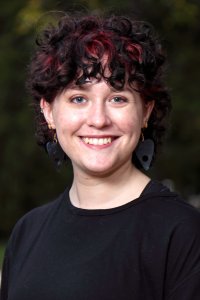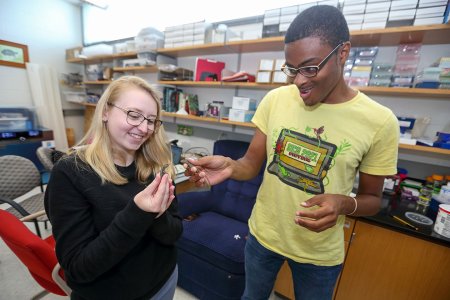
Ongoing Evolution
Ohio Wesleyan Alumni Publish Peer-Reviewed Lizard Research as Reptiles, Careers Flourish

Ohio Wesleyan assistant professor Eric Gangloff has seen more than lizards evolve since joining the University's Biological Sciences faculty in 2019.
During a research journey that has earned him all or part of two National Science Foundation (NSF) grants since 2022, Gangloff, Ph.D., also has watched his OWU students develop as scientists.
Over the past five years, Gangloff says, "Fifteen different students have co-authored a total of 15 peer-reviewed journal articles including nine with student first authors."
Peer-Reviewed Publication
The latest example of this successful mentorship appears this fall in the Journal of Experimental Biology.

Alyssa Head, OWU Class of 2024, is the lead author of an article titled "Include the females: morphology-performance relationships vary between sexes in lizards."
The article explores the differences in how male and female Common Wall Lizards are evolving in response to their environment along with the significance of those changes. The article's co-authors include Gangloff; OWU young alumni Cece Colwell '21, Princeton Vaughn '22, and Ethan Livingston '24; and Martha Muñoz, Ph.D., of Yale University.
'Wonderful Wall Lizards!'
While at Ohio Wesleyan, Head majored in Pre-Professional Zoology and spent two years working as a paid research assistant in Gangloff's laboratory. She was compensated through Gangloff's NSF grant and supported by OWU's annual, 10-week Summer Science Research Program.
These days, Head continues to work with what she calls the "wonderful wall lizards!" while pursuing her master's degree in Biology with an Evolutionary Biology focus at San Diego State University. Ultimately, she plans to obtain her Ph.D.
"My thesis is investigating how a population of seven Italian wall lizards in Los Angeles County were able to overcome founder effects to thrive in a new thermal environment," Head explains.
Traditionally, she says, larger gene pools are required for successful evolution and adaptation. Head wants to know how such a small number of reptiles have been able to adapt so well to a new environment and new ecology.
"This apparent contradiction is called 'the invasive species paradox,'" she says. "In my thesis, I will be exploring this using genetic and thermal comparisons between our introduced population in Los Angeles and the original population in Sicily."
Advice for Undergraduates
In addition to publishing her manuscript, the Journal of Experimental Biology also interviewed Head for an accompanying "ECR (Early Career Researcher) Spotlight." In it, she shares advice for undergraduates seeking to forge their own science careers.
"I think my advice for students who are in the process of completing their undergraduate degree and are interested in doing research would be to talk to your professors," she states. Better yet, go on your school's website and read what research your professors are doing and then ask them about it. …
"I would not be doing what I am if not for the support of my fantastic professors who provided so much insight into the possibilities for my future, were such strong supporters of undergraduate-led research opportunities and projects, and inspired me to continue following my passions."

Inspiring Outcomes
Like Head, her OWU co-authors and classmates are making their own professional marks: Colwell is now a clinical research specialist II in human gene therapy at The Ohio State University, Vaughn is a doctoral candidate in Ecology & Evolutionary Biology at Princeton University, and Livingston is pursuing his master's degree in Biology at Villanova University.
And at Ohio Wesleyan, Gangloff continues his reptile research with a new generation of students, who this summer dubbed themselves the "Lizard League." The ongoing research also is influenced by Head's work and includes studying differences in male-female evolution, he says.
"I'm an invited symposium speaker at the upcoming meeting of the Society for Comparative and Integrative Biology (SICB) in January in Atlanta," Gangloff adds, "and I'll be examining some other dimensions of this work in that talk."
Ongoing Success
As he recounts the accomplishments of his current and former Ohio Wesleyan students, Gangloff notes that several of them have presented previously at the same national meeting.
"Nine students have presented at SICB meetings (including two oral presentations, which is most unusual at such a conference), eight have presented at meetings of Ohio Partners in Amphibian and Reptile Conservation, and students have presented at every fall and spring research symposium to date here at OWU," he says.
"I am continually inspired by the creativity and dedication that students bring to our work," Gangloff concludes. "I am immensely proud of their accomplishments, but at the same time not at all surprised by this success. We continue to work together as these former students are now colleagues and collaborators."
And Head shares that working and learning in Gangloff's lab is a highlight of her undergraduate career.
'Tools, Connections, and Experience'
"Going into Dr. Gangloff's lab, I knew I wanted to do research, and I knew that I wanted to work with reptiles," she says. "He gave me the tools, connections, and experience that I needed in order to make my passions a career.
"One of my favorite parts of the last half of my undergraduate career," Head says, "was sitting in his office 'talking shop,' coming up with ideas for future projects, cool new research, different interpretations of data, and how to be better scientists."
And the evolution continues.
Learn more about Gangloff's research and the success of his OWU students at G.L.A.R.E., the Gangloff Laboratory of Amphibian and Reptile Ecophysiology.
